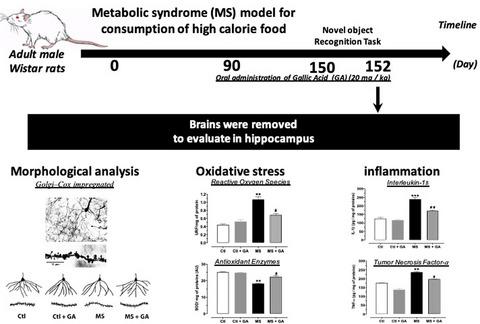Our official English website, www.x-mol.net, welcomes your feedback! (Note: you will need to create a separate account there.)
Gallic acid improves recognition memory and decreases oxidative-inflammatory damage in the rat hippocampus with metabolic syndrome.
SYNAPSE ( IF 2.3 ) Pub Date : 2020-08-11 , DOI: 10.1002/syn.22186 Alfonso Diaz 1 , Guadalupe Muñoz-Arenas 1 , Karen Caporal-Hernandez 1 , Rubén Vázquez-Roque 2 , Gustavo Lopez-Lopez 1 , Anna Kozina 3 , Blanca Espinosa 4 , Gonzalo Flores 2 , Samuel Treviño 1 , Jorge Guevara 5
SYNAPSE ( IF 2.3 ) Pub Date : 2020-08-11 , DOI: 10.1002/syn.22186 Alfonso Diaz 1 , Guadalupe Muñoz-Arenas 1 , Karen Caporal-Hernandez 1 , Rubén Vázquez-Roque 2 , Gustavo Lopez-Lopez 1 , Anna Kozina 3 , Blanca Espinosa 4 , Gonzalo Flores 2 , Samuel Treviño 1 , Jorge Guevara 5
Affiliation

|
Metabolic syndrome (MS) results from excessive consumption of high‐calorie foods and sedentary lifestyles. Clinically, insulin resistance, abdominal obesity, hyperglycemia, dyslipidemia, and hypertension are observed. MS has been considered a risk factor in the development of dementia. In the brain, a metabolically impaired environment generates oxidative stress and excessive production of pro‐inflammatory cytokines that deteriorate the morphology and neuronal function in the hippocampus, leading to cognitive impairment. Therapeutic alternatives suggest that phenolic compounds can be part of the treatment for neuropathies and metabolic diseases. In recent years, the use of Gallic Acid (GA) has demonstrated antioxidant and anti‐inflammatory effects that contribute to neuroprotection and memory improvement in animal models. However, the effect of GA on hippocampal neurodegeneration and memory impairment under MS conditions is still unclear. In this work, we administered GA (20 mg/kg) for 60 days to rats with MS. The results show that GA treatment improved zoometric and biochemical parameters, as well as the recognition memory, in animals with MS. Additionally, GA administration increased hippocampal dendritic spines and decreased oxidative stress and inflammation. Our results show that GA treatment improves metabolism: reducing the oxidative and inflammatory environment that facilitates the recovery of the neuronal morphology in the hippocampus of rats with MS. Consequently, the recognition of objects by these animals, suggesting that GA could be used therapeutically in metabolic disorders that cause dementia.
中文翻译:

没食子酸可改善具有代谢综合征的大鼠海马的识别记忆并减少氧化炎症损伤。
代谢综合征 (MS) 是由过度食用高热量食物和久坐不动的生活方式引起的。临床上观察到胰岛素抵抗、腹部肥胖、高血糖、血脂异常和高血压。MS 被认为是痴呆症发展的危险因素。在大脑中,代谢受损的环境会产生氧化应激和促炎细胞因子的过度产生,从而使海马体的形态和神经元功能恶化,导致认知障碍。治疗替代方案表明,酚类化合物可以成为治疗神经病和代谢疾病的一部分。近年来,没食子酸 (GA) 的使用已证明具有抗氧化和抗炎作用,有助于动物模型中的神经保护和记忆力改善。然而,GA对MS条件下海马神经变性和记忆障碍的影响尚不清楚。在这项工作中,我们对患有 MS 的大鼠给予 GA (20 mg/kg) 60 天。结果表明,GA 治疗改善了 MS 动物的动物测量和生化参数以及识别记忆。此外,GA 给药增加了海马树突棘并减少了氧化应激和炎症。我们的结果表明,GA 治疗可改善新陈代谢:减少氧化和炎症环境,促进 MS 大鼠海马神经元形态的恢复。因此,这些动物对物体的识别表明 GA 可用于治疗导致痴呆的代谢紊乱。
更新日期:2020-09-02
中文翻译:

没食子酸可改善具有代谢综合征的大鼠海马的识别记忆并减少氧化炎症损伤。
代谢综合征 (MS) 是由过度食用高热量食物和久坐不动的生活方式引起的。临床上观察到胰岛素抵抗、腹部肥胖、高血糖、血脂异常和高血压。MS 被认为是痴呆症发展的危险因素。在大脑中,代谢受损的环境会产生氧化应激和促炎细胞因子的过度产生,从而使海马体的形态和神经元功能恶化,导致认知障碍。治疗替代方案表明,酚类化合物可以成为治疗神经病和代谢疾病的一部分。近年来,没食子酸 (GA) 的使用已证明具有抗氧化和抗炎作用,有助于动物模型中的神经保护和记忆力改善。然而,GA对MS条件下海马神经变性和记忆障碍的影响尚不清楚。在这项工作中,我们对患有 MS 的大鼠给予 GA (20 mg/kg) 60 天。结果表明,GA 治疗改善了 MS 动物的动物测量和生化参数以及识别记忆。此外,GA 给药增加了海马树突棘并减少了氧化应激和炎症。我们的结果表明,GA 治疗可改善新陈代谢:减少氧化和炎症环境,促进 MS 大鼠海马神经元形态的恢复。因此,这些动物对物体的识别表明 GA 可用于治疗导致痴呆的代谢紊乱。



























 京公网安备 11010802027423号
京公网安备 11010802027423号